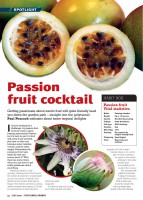Special Offers
Redeem Offer Code
Redeem Gift Voucher
Scarecrow Members
Our Feedback
Thank you all very much for the two trees that arrived yesterday. As you may remember they were for my wife's birthday and she was absolutely delighted. We have followed the instructions and they are now looking very nice in our small but crammed garden. They were well packed and even as she unwrapped them she had no idea what they were, a perfect surprise.
So impressed was she with the service, I think other orders may follow.
Jeff Mead, Theale, Reading

Passion Fruit Cocktail
 Getting passionate about exotic fruit will quite literally lead you down the garden path straight into the polytunnel. Paul Peacock enthuses about some tropical delights
Getting passionate about exotic fruit will quite literally lead you down the garden path straight into the polytunnel. Paul Peacock enthuses about some tropical delights
If youre looking for a challenge, try passion fruit. Its fairly easy to grow, bearing spectacular flowers, but its hard to get it to fruit and, even if you succeed, you have to take care because some varieties contain cyanide when unripe. Fortunately, the poisonous fruit taste awful! So why am I raving about it? Well, there are some times when you just have to get really passionate about something.
Passiflora edulis is a fastgrowing, climbing shrub thatll reach five metres if allowed to. It holds itself in place by means of tendrils, and flowers in this country from June to August. The flowers are famous, being used to illustrate the Passion of Christ by missionaries in South America, where the plant originates.
Itll grow on any soil as long as its well-drained and fairly nutrient-rich. But it wont tolerate shade at all, and to get it to fruit it needs to be grown in the tunnel although it will grow outside quite successfully in the south of the country.
The varieties with edible fruit include Passiflora edulis, Passiflora incarnata and Passiflora vitifolia so if you stick to these you should be alright. You can buy seeds quite readily in the UK, and they need to be sown under heat in late winter; January is a good time. Some growers advise soaking the seeds, others dont bother. They germinate in a month and grow quite quickly. By June they can be transplanted to their growing position in the tunnel. A framework of wires against the end wall is a good place, so long as its sunny.
Each spring give the plant a good mulch of compost and feed during the summer tomato feed is as good as any. When the fruit fall off the plant theyre ripe. You can cut the branches back once the plant threatens to hit the roof!
Passion Fruit Vital Statistics
- Habit: Twining climber.
- Height: Up to 10 metres.
- Spread: Decided by pruning.
- Foliage: Semi-deciduous.
- Soil type: Well-draining.
- Position: Sun.
- Min temp: 15°C.
- Pruning: As required by simple cutting back.
- Flowering: June-August.
- Fruit: Ripe from late summer.
Pleasures Of The Mango Flesh!
Another passionate plant, this time from India, the mango is great fun and easy to grow. It must be kept in temperatures higher than 12°C, and demands little more than some good, old-fashioned TLC.
Mango is the most popular fruit in the world, with more being eaten year-on-year. There are 1,000 varieties and its been cultivated for over 4,000 years.
Its interesting that the supply of mango seed for growers in the UK has suddenly dried up, with very few outlets offering them for sale. No matter, you can get them from the supermarket!
- Take your shop-bought fruit, cut out the seed and enjoy the flesh! Clean the seed and roughen it up with a piece of sandpaper.
- Place this in moist compost at around 15°C, then keep it moist but not wet.
- Within six weeks the seed will have produced a shoot sometimes more than one, just cut out the weakest.
- Transplant the seedling after three months growth to a slightly larger pot, and keep it moist and fed with tomato food over the summer.
- Water every two weeks with rainwater which they prefer. Water in the winter only to stop it drying out.
- After a year pinch out the growing tip, which will make the plant more bushy. You can repeat this on the other branches to create a plant thats happy being small enough to be manageable in a polytunnel.
- Mango trees in the tropics grow to 40m. By the following June there should be flowers and, by late summer, fruits should be ripening. Remove the fruit as late as you can at the end of summer.
Mango Vital Statistics
- Habit: Large tree.
- Height: Naturally 35-40m, 2m if controlled.
- Spread: Decided by pruning.
- Foliage: Deciduous.
- Soil type: Well-draining.
- Position: Sunny.
- Min temp: 12°C.
- Pruning: Pinch-out buds to create the plant you require.
- Flowering: June-August.
- Fruit: Ripe from late summer.
This article first appeared in the July 2007 edition of Grow It magazine. To download a pdf copy of the original article click on the image below...

 01233 740529
01233 740529


